2020 Vision: Post-debate polls show new shape in Democratic race
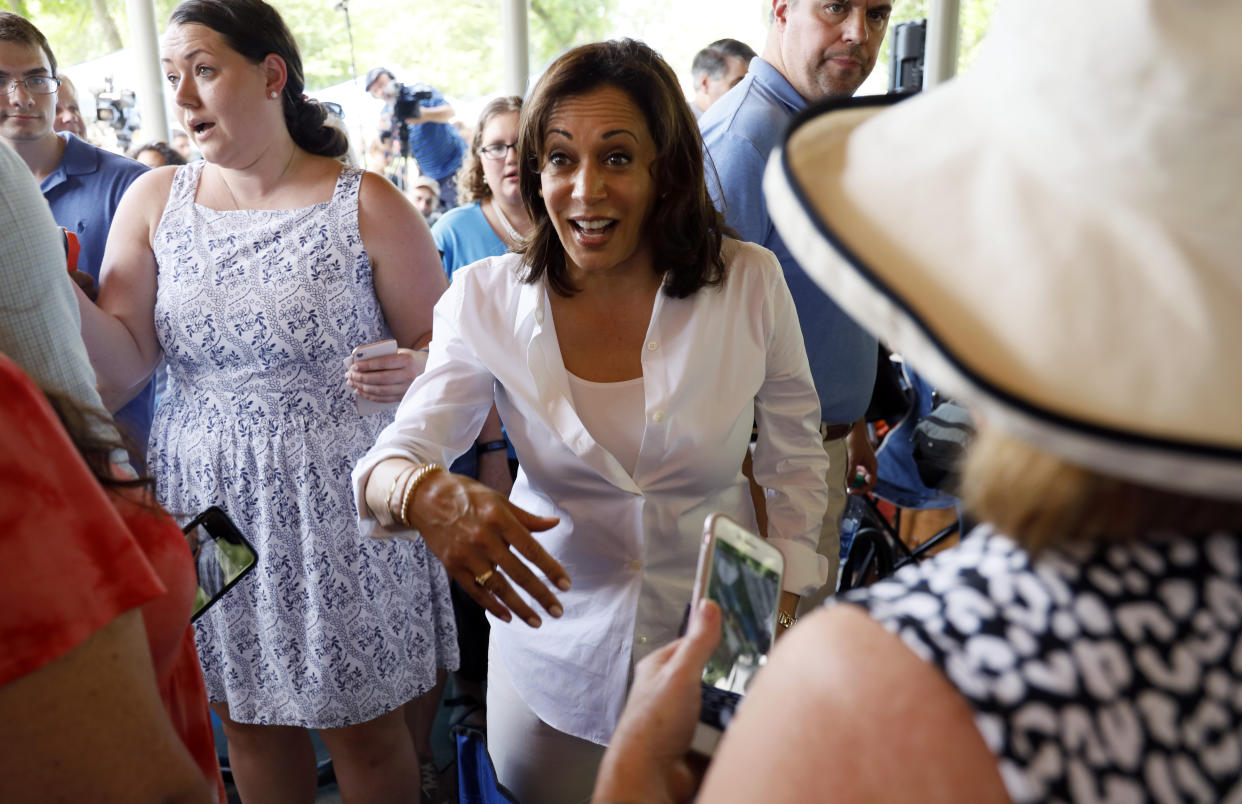
Welcome to 2020 Vision, the Yahoo News column covering the presidential race. Reminder: There are 213 days until the Iowa caucuses and 486 days until the 2020 presidential election.
As polls start to roll out surveying Democrats in the wake of the first debates, so far most of the results are lining up with last week’s conventional wisdom: It was a good night for Sen. Kamala Harris, and despite former Vice President Joe Biden’s early polling advantages, he has anything but an easy road to clinching the nomination.
Last Thursday’s debate found Biden challenged from all sides — on his age, on his vote for the Iraq War, on his claims he will work with Senate Majority Leader Mitch McConnell — but no blow landed harder than Harris and Biden’s back-and-forth on his work with segregationist senators. (That fight continued through the candidates’ Fourth of July visit to Iowa.) Harris raised $2 million in 24 hours after the debate and was crowned the night’s big winner by pundits.
Polls taken after the debates mostly confirm the theory that the first round of debates led to a tightening race:
• Quinnipiac found Biden tumbling down 8 percentage points to 22 percent from its June survey, while Harris leapt from 7 percent to 20 percent.
• CNN found Biden at 22 percent (down from 32 in late May), Harris at 17 percent (up from 8 percent) and Sen. Elizabeth Warren at 15 percent (up from 7 percent). Sen. Bernie Sanders slid from 18 percent to 14 percent.
• A survey conducted by ABC News and the Washington Post is a bit of an outlier, as it still shows Biden (29 percent) and Sanders (23 percent) at the front of the pack, with Harris and Warren tied at 11 percent.
• A Suffolk University/USA Today poll found a fluid race in Iowa, with Biden at 24 percent, Harris at 16 percent, Warren at 13 percent and Sanders at 9 percent. Perhaps more important, 21 percent of respondents were undecided and 60 percent said they might change their mind before the February caucuses.
One of Biden’s biggest advantages so far in the race is the belief by many that he would have the best chance of defeating President Trump in the general election, making him a favorite among those attempting to make an “electability” argument. According to a HuffPost/YouGov poll, that advantage is slipping away, as respondents believed in a number of candidates when asked which Democrats were capable of winning in November 2020. Biden led with 57 percent saying he was capable, but that number is down from 70 percent in May.
That tightened the spread considerably, as Warren jumped to 51 percent from 40 percent, Harris jumped to 49 percent from 39 percent and Sanders ticked up to 46 percent from 45 percent. (Former Texas Rep. Beto O’Rouke had the second-biggest fall behind Biden, going from 30 percent to 18 percent, while his fellow Texan Julián Castro, the former Housing and Urban Development chief, climbed from 9 percent to 21 percent after what was seen as a strong performance.)
This could all snap back after another debate, should Harris struggle while Biden, Sanders, Warren or one of the second-tier candidates make an impressive showing. It’s still more than 200 days until anybody actually casts a vote, but the current snapshot shows a race with four clear contenders for the nomination: Biden, Harris, Sanders and Warren.
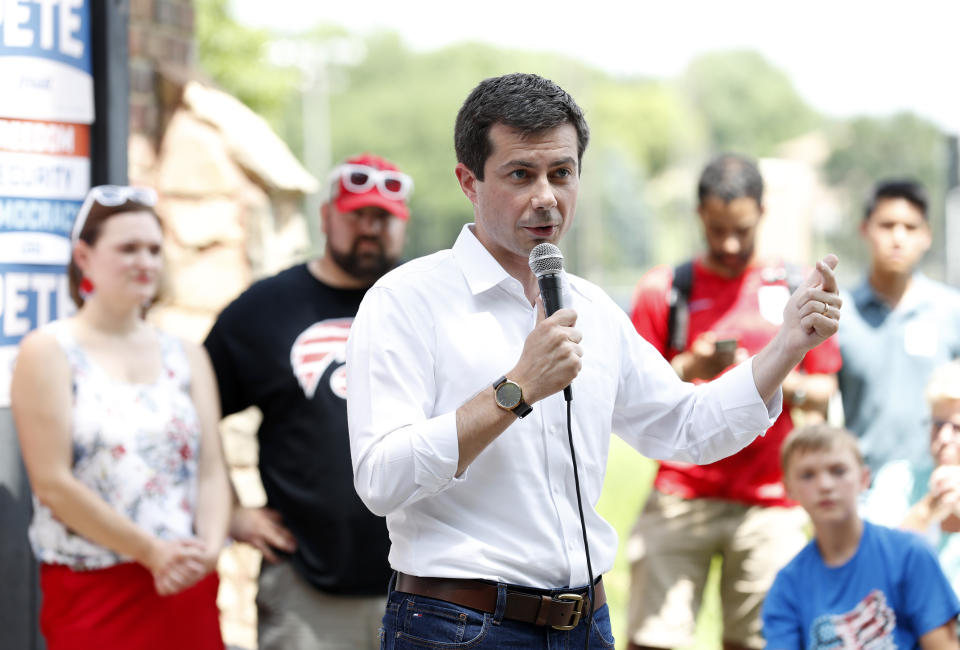
Buttigieg’s big haul
South Bend, Ind., Mayor Pete Buttigieg didn’t get much of a post-debate polling bump, but he made headlines this week for another reason: A massive fundraising haul. The campaign said Buttigieg raised $24.8 million from 294,000 people in the second quarter of 2019, a staggering number that came in ahead of even Sanders’s lucrative organization and Biden’s productive launch.
A Buttigieg campaign staffer told Yahoo News that they’re attempting to match big-dollar fundraising (Buttigieg, a Harvard grad and former McKinsey analyst, is popular among denizens of both Wall Street and Silicon Valley) with a grassroots push.
“We take an ‘all of the above’ fundraising strategy, from $1 online donations, donations made through social media, all the way up to max contributions and having people raise money on our behalf,” the aide said.
“I think one of the more successful components of our strategy has been approaching stressing grassroots events. Not only do these raise significant resources, they also bring in new donors. Fifty-four percent of people at grassroots are brand-new to the campaign — someone who might not know much about Pete can pay $25 and get up-close with Pete.” (Read the full story on the mayor’s fundraising operation here.)
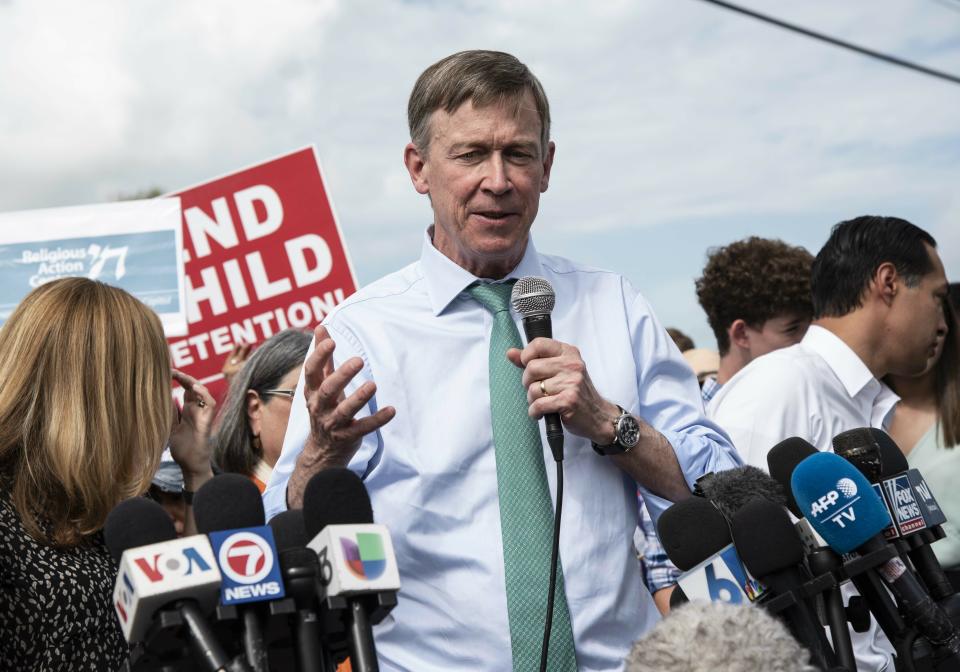
Hickenlooper’s candidacy teeters
While the top of the Democrats’ 25-person field is understandably getting most of the attention, there’s another slightly darker question among observers: Which candidate is going to drop out first? The September debates have requirements a majority of the candidates are unlikely to hit (130,000 individual donors and 2 percent in at least four Democratic National Committee-approved polls), so the possibility of a late-summer culling is looming.
The first candidate to maybe go? Perhaps former Colorado Gov. John Hickenlooper. On Monday, Politico reported that his finance director was moving to the O’Rourke campaign. On Tuesday, the campaign manager, communications director and digital director were all leaving, according to a second Politico report, which also stated that Hickenlooper only had about 13,000 donors, had raised just over $1 million in the second quarter and would likely run out of money in about a month. Hickenlooper responded by blaming the departing staffers and progressive policies he doesn’t support.
“I’m not going to get into it until we pull the numbers together,” said Hickenlooper of the fundraising during an MSNBC interview. “But the bottom line is for a small campaign like us … it’s harder to raise money because we’re not promising free health care or, you know, to forgive free tuition for everyone, forgive student debt.”
Hickenlooper’s candidacy suffered from a muddied launch, with the former governor first refusing to identify as a capitalist and then pivoting all the way to becoming perhaps the race’s foremost basher of socialism. The debate was a chance for Hickenlooper to make some kind of mark, but that fell flat: A flash poll by the progressive group Indivisible of its membership after the second debate saw him come in last, earning zero percent.
Of the polls mentioned above, Hickenlooper registered 1 percent in the ABC News/Washington Post survey but had zeroes in the others. Aides, analysts and pundits have pushed for Hickenlooper to drop out and run against Republican Sen. Cory Gardner in the 2020 race, but he’s been adamant he’s more comfortable as an executive and will not flip races.
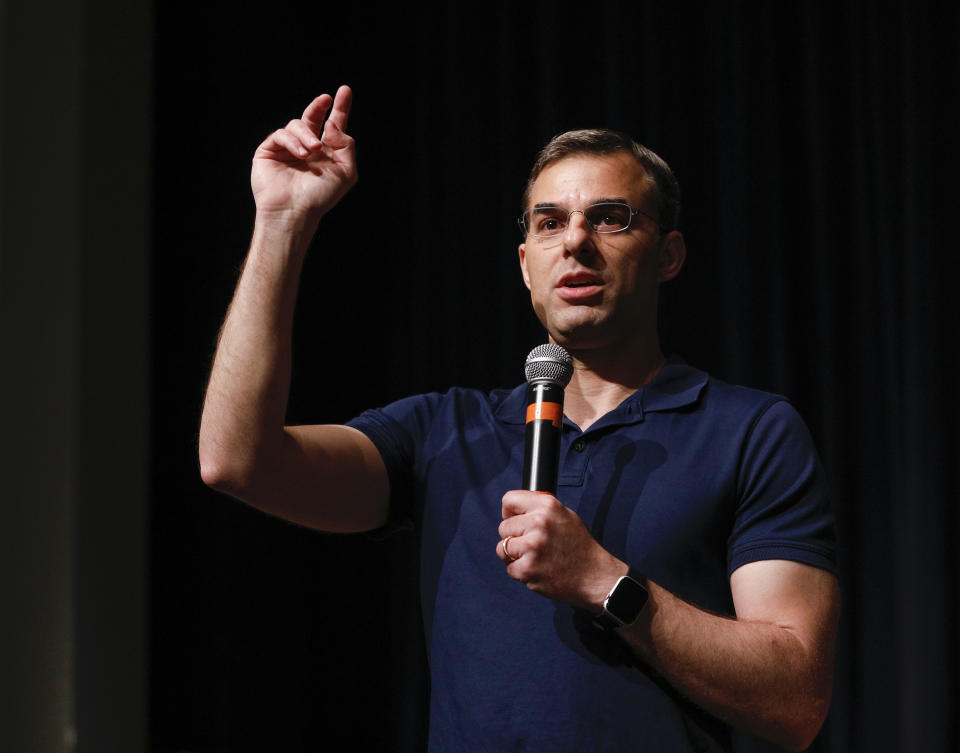
Amash declares independence from GOP
A congressional race that was set to be among the most watched in 2020 got a little more interesting earlier this week: In a July 4 Washington Post essay thematically tied to the holiday, Michigan Rep. Justin Amash announced he was leaving the Republican Party, blaming the extreme partisanship in Washington. Amash had stood as the only sitting GOP legislator to call for an impeachment inquiry against Trump and in doing so made a host of enemies in his now-former party, including a pro-Trump primary challenger who appeared to have the backing of Donald Trump Jr.
Amash hasn’t said if he will caucus with Republicans or Democrats.
With Amash’s departure, the count of Republican legislators calling for impeachment drops to zero.
The name “Trump” does not appear in Amash’s declaration, and he instead focuses on the divide between the two parties and the power given to party leadership which impedes deliberation and problem-solving, writing, “We are fast approaching the point, however, where Congress exists as little more than a formality to legitimize outcomes dictated by the president, the speaker of the House and the Senate majority leader.”
After the announcement, nonpartisan analysts moved the race for the Third Congressional District from a rating of “Likely Republican” to “Toss-up,” as the door now opens for the Democrats to steal a three-way race.
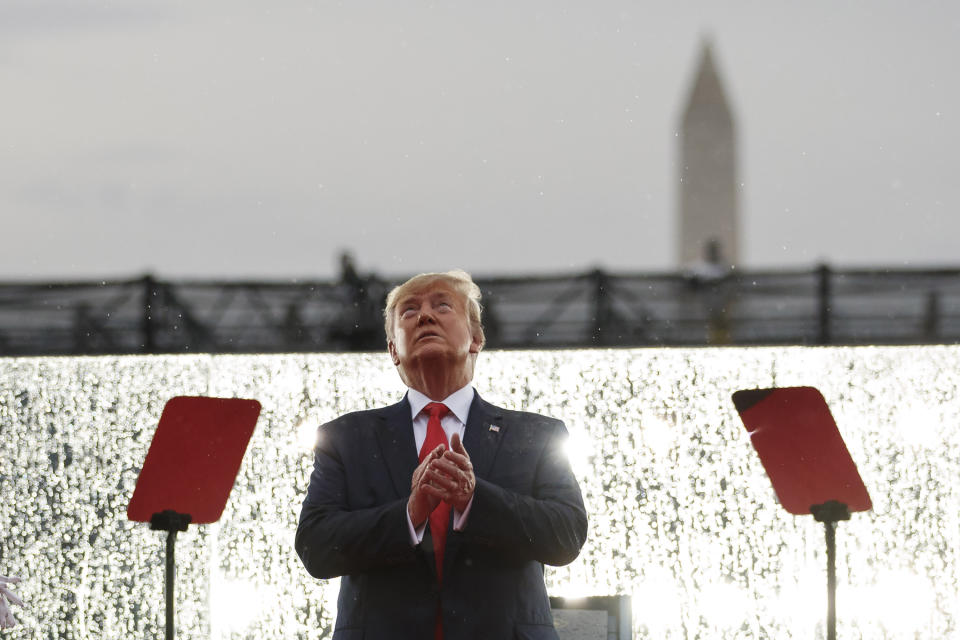
Verbatim
“I was prepared for them to come after me, but I wasn’t prepared for the person coming at me.”
— Joe Biden, to CNN, on Kamala Harris’s attack on him during the first Democratic debate
“Racism is not going to help us.”
— Pete Buttigieg, in Iowa, to a voter who said that he should tell “the black people of South Bend to stop committing crimes and doing drugs”
“The Continental Army suffered a bitter winter of Valley Forge, found glory across the waters of the Delaware and seized victory from Cornwallis of Yorktown. Our Army manned the air, it ran the ramparts, it took over the airports, it did everything it had to do.”
— President Trump, in his July 4 speech, stumbles by referencing airports during the American Revolution
Read more original 2020 coverage from Yahoo News:





